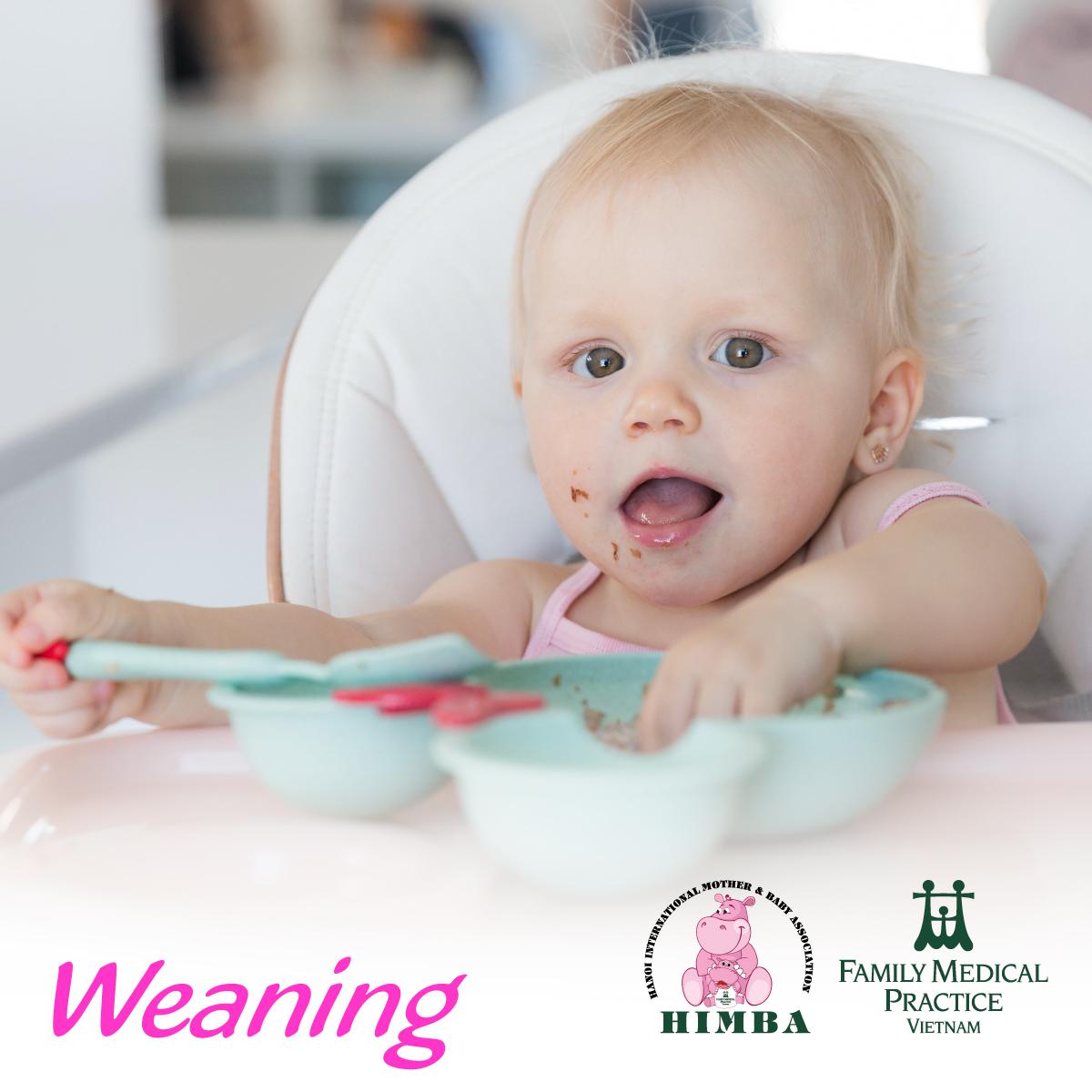HIMBA Healthy Children: Weaning

HIMBA Healthy Children: Weaning
The World Health Organisation state, since 2001 (and reaffirmed in 2012) that babies should begin weaning at around 6 months.
Is my baby ready?
- Around 6 months, babies are developmentally read to tolerate food. The tongue thrust is a reflex we check for - babies that immediately push the food back out of their mouths when food touches the tongue are not ready for weaning and are more likely to gag and choke.
- Babies that do not push food out with their tongue, can bring their lips together around the spoon when food enters, can open their mouth wide and can also move their tongue around when not eating food -show signs of readiness.
- At 6 months a baby can sit up in a high chair and hold their head up without support. - They should also be able to bring items from their hand to their mouth and show coordination.
From six months, babies require foods from all food groups consisting of different textures, colours and quantities to ensure a varied diet. This provides the vitamins and nutrients your baby needs.
Vitamin A,C,D,E supplementation is recommended (WHO) to all infants drinking less than 500mls of formula and Vitamin D 10IU for breastfed infants as this cannot be obtained from diet alone.
Two methods of weaning:
Traditional weaning - spoon feeding purees to mashed foods and then to finger foods.
Baby led weaning - soft family foods from the very beginning - sticks of soft finger foods i.e steamed carrots/ avocado sticks.
What does the evidence tell us?
- Studies show that there are no increased risks of choking between methods (gums are very able to chew at 6 months so finger foods are acceptable)
-Research indicates baby led weaning reduces fussiness in later childhood eating habits
- Baby led weaning improves hand and eye coordination and ability to regulate appetite- reducing obesity in later life.
-Baby led weaning improves the chewing and digestion functions which are important for satisfaction
-Baby led weaning can reduce iron intake if babies do not select iron rich foods. Consider finger foods high in iron (red meat, eggs, dark green vegetables). Iron from 6 months is a priority.
- Infant weight appears to be stable across both groups - spoon feeding could cause children to be overweight in later childhood
Please note - if you are using baby led weaning you should cut food into soft, fist size strips so babies can pick it up and ensure no choking foods i.e whole grapes/nuts/skins of fruits. Cut harder foods length wise to prevent choking.
TO start...
- Get a big bib
- Continue to provide all the usual milk feeds and you can offer water at mealtimes - ideally in a free-flow cup to encourage sipping and not sucking which is better for the teeth.
-Try and enjoy offering your baby new, colourful foods- not processed foods. All food groups can be introduced from 6 months - note the foods below you cannot give a baby.
- At the beginning you can mix breastmilk (or cows milk if over 6 months) into the foods to introduce the flavours or start with individual vegetables such as carrot puree or soft steamed sticks.
-Don’t be surprised if your baby does not like the foods, it can take 10-15 times for them to accept a new food
-Start slowly, just one or two foods in front of your baby at mealtimes. Add combinations after a week or two.
-Eat with your baby to promote a ‘family meal time’ environment
-Introduce ‘allergens’ on their own and only a small amount to test for any reaction. -Allergens occur in 4% of children. These are: Eggs, soy, cows milk, nuts, shellfish, fish, wheat. If there is a strong family history of allergy, consult with an allergy specialist on when to start this. Please note evidence now suggests that introducing allergen foods between 6-12 months in all children is advisable at reducing the risk of allergy.
-Never leave a baby unattended when feeding in case of choking and attend a paediatric first aid course.
* Vegetables washed in baking soda have been shown to destroy vitamin C, B and riboflavin. Best to use a commercial vegetable wash product.
What to avoid giving a baby:
Honey - the risk of botulism
Processed foods - excess of sugar and salt
Whole Nuts / grapes - Choking hazard
Artificially sweetened foods -sugar can cause food preferences, dental decay and poor nutrition and weight.
E numbers on the food label
Smoked or cured meats - high in salt
Salty snacks - the kidneys cannot process salt well
Milk -
You can now introduce cows milk into food. For example: yoghurt, cheese, milk in foods. Continue with infant formula 1 and not infant formula 2 as this is considered unnecessary by the World Health Organization.
IRON - some countries with high levels of anaemia recommend an iron supplement between 6-24 months. Please check with a doctor.
-
https://www.ncbi.nlm.nih.gov/pmc/articles/PMC5438437/
https://www.firststepsnutrition.org/eating-well-infants-new-mums
https://www.who.int/nutrition/topics/WHO_brief_fufandcode_post_17July.pdf
 本ウェブサイトでは、みなさまが快適にご利用いただけるよう、Cookieを使用しています。
本ウェブサイトでは、みなさまが快適にご利用いただけるよう、Cookieを使用しています。